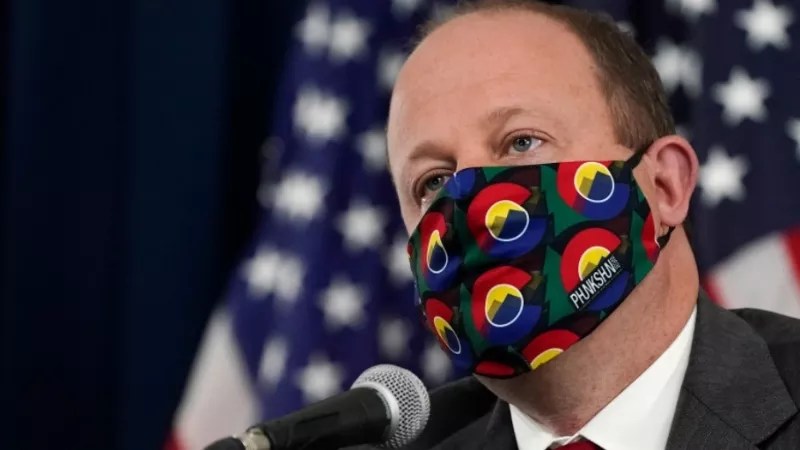
colorado.gov via 9News

Audio By Carbonatix
The decision by federal agencies to pause the dispensing of the Johnson & Johnson COVID-19 vaccine following reports that six individuals nationwide suffered rare blood clots after being inoculated is having ripple effects in Colorado.
During an April 13 press conference, Governor Jared Polis confirmed that the state will follow the feds’ lead and put Johnson & Johnson usage on hold until officials give their okay to start doling out shots again – a process that may take just a day or two, though there’s no guarantee of that. In the meantime, he added, the state will do its best to provide extra Pfizer and Moderna doses to vaccination sites so that Coloradans with Johnson & Johnson appointments won’t have to reschedule over the next couple of days, at least. However, he conceded that some appointments likely won’t happen on time, and those who’d prefer what he called the “one and done” Johnson & Johnson formula will need to wait to get it.
After a brief introduction, Polis handed the spotlight to Colorado Department of Public Health and Environment Chief Medical Officer Dr. Eric France, who provided more details about the clots. France pointed out that most of the symptoms that raised alarms among officials in the half-dozen clotting cases developed six or more days after the initial injection – a reaction very different from those experienced by eleven folks at the Dick’s Sporting Goods Park mass vaccination site on April 7 prior to its temporary shutdown. (One of the two people hospitalized that day told us he has a condition that makes him prone to fainting, and stressed that his loss of consciousness had nothing to do with the shot.) France revealed that a committee has been formed to study data related to the clots to determine whether their occurrence appears to be coincidental or related to the vaccine.
Right now, no cases of clotting have been found in Colorado, but France said it’s certainly possible that one or more could be confirmed over the next 24 to 48 hours. But if the committee is satisfied that the Johnson & Johnson vaccine didn’t cause the clots, the medication could be available again within a matter of days. Should a link be established, however, supply issues could arise. Polis expressed confidence that Colorado has enough of the Pfizer and Moderna vaccines to fill gaps in the short term, but if the pause lasts much longer, the pace of overall vaccinations could slow, thereby delaying the goal of achieving herd immunity over the novel coronavirus.
For his part, Polis said he’s seen no evidence that shakes his confidence in the Johnson & Johnson vaccine, which he said he would take personally without hesitation.
Meanwhile, Polis acknowledged that data related to COVID-19 in Colorado is getting worse, as witnessed by 1,904 new positive cases reported yesterday, April 12, and a daily positivity rate that spiked to 7.84 percent, the highest the state has registered of late. The positivity rate’s surge is most likely related to both an increased prevalence of the disease, thanks to the rise of more transmissible variants, and less testing than is necessary under the circumstances, he asserted. These facts prompted Polis to emphasize the importance of folks getting tested if they exhibit virus symptoms or think they’ve been exposed, and self-isolating if they’ve contracted COVID-19. He also reiterated the importance of wearing masks, social distancing and staying away from large gatherings, especially for those who have not yet been fully vaccinated. (To date, approximately 25 percent of the state’s population has completed the course of medication.)
Still, these problems haven’t forced Polis to drop plans to return oversight of COVID-19 safety protocols to the county level on Friday, April 16 – a move that seems to bring along significant risk, particularly if conservative jurisdictions decide to dump every rule they can. Adding to such concerns was a report shared by CDPHE Executive Director Jill Hunsaker Ryan predicting that rising case counts and hospitalizations will only be held at bay if current levels of disease mitigation (facial coverings and so on) are maintained for at least the next month.
Dr. John Douglas, executive director of Tri-County Health, which encompasses Adams, Arapahoe and Douglas counties, tried to allay fears that COVID-19 regulations might simply be dropped within days. He said he’s been working with other counties in the Denver metro area to follow the state’s dial system in a modified way for the next thirty days. After that, the counties will enter what he referred to as a “clear level,” when all limitations would be lifted and business capacity would return to normal, with officials observing to make sure that no deterioration occurs. But only the overwhelming of the hospital system, and not simply a surge in case count, would trigger a return to restrictions, Douglas noted.
For his part, Polis was defensive at the suggestion that all of Colorado’s public-health orders are set to end on the 16th. He pointed out that a liberalized mask rule will remain in place until early May, and that large indoor events with attendance of 500 or above will remain under state supervision for the next month or so.
In general, though, the governor seemed eager to pass along COVID-19 oversight to others in most instances. When asked amid a subsequent question-and-answer session if he could envision businesses being shut down again if the virus counts go up, he said that would be a matter for locals to consider, not him – and his tone was marked by a sense of relief.